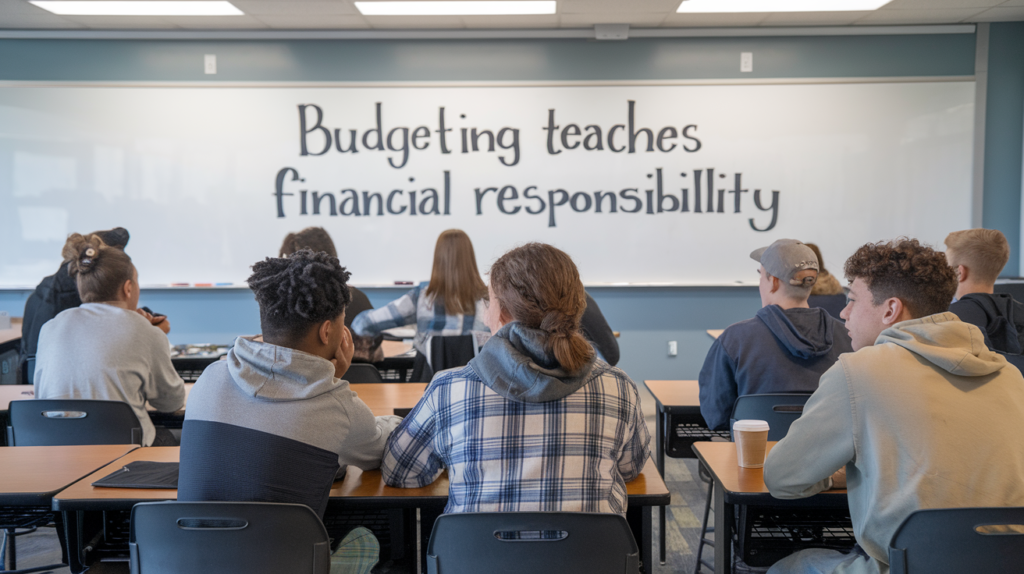Are college life exciting yet overwhelming? Are financial concerns a regular source of stress for you?” How Budgeting Teaches College Students Financial Responsibility” can address these common feelings as students navigate newfound independence while managing their finances.
This is found in budgeting. A simple concept yet one of the mightiest tools through which students can control their spending while maintaining financial discipline. Such is how a budget maximizes an individual’s understanding of their well-being and enables wiser decisions.
How Budgeting Teaches College Students Financial Responsibility It’s not just about cutting down the expenses but rather bridging to eventual financial security. Students lay a solid financial foundation for future use, applying knowledge they acquire on wise management of money in college over many years after graduation.
Table of Contents
The Importance of Financial Literacy

In this regard, financial literacy is the grounding that successful money management is anchored on. When college students understand the importance of financial literacy it empowers them with the ability to make effective decisions on money and become proactive in its management, ensuring resource allocation is possible, and need over wants are prioritized, planning for short-and long-term goals set.
In the current financial environment, wise financial choices are more crucial than ever. Students who are highly financially literate are better equipped to handle unexpected adversity and also seize opportunities that align with their goals. Teach the students the ABCs of budgeting-an investment in their future success and independence.
Understanding Budgeting Basics

Students need to understand budgeting before the financial literacy journey. Budgeting is a comprehensive income and expense plan. In this process, the money is wisely allocated for various essentials, savings, and discretionary spending. Therefore, by establishing a budget, they are able to exercise greater control over their finances and learn to live within their means.
The most significant advantage of budgeting is the discipline it instills. Students tend to spend less and are less likely to make impulse purchases due to this increased self-control. Budgeting also promotes them to set realistic financial goals and work towards attaining them. Understanding why budgeting is important, students can develop a firm foundation for being responsible in their finances.
Practical Steps to Teach Budgeting

Teachinng them money management techniques will, thus call for a systematic way to teach college students effective ways of budgeting. It will follow these:
Calculate Net Income
The first step in making a budget is to determine the total amount of income a student generates from different sources, such as jobs, scholarships, or allowances. With this, students can then know how much money they have at their disposal for spending and saving. Find more budgeting tips.
Set Clear Expectations
Financial responsibilities also include contributions toward tuition as well as living expenses and should be discussed upfront. Making students contribute financially enables them to feel a certain level of ownership and accountability to their budget. This ensures they are in control of their financial future.
Use Budgeting Tools
Introduce students to budgeting apps or online tools that simplify tracking income and expenses. These tools provide real-time insights into spending patterns and help students avoid overdrafts and impulsive purchases. Consistent monitoring of finances is essential for maintaining financial stability. Learn about teaching budgeting.
Understanding Debt Management

Payment management is key to teaching students financial responsibility and hence debt management, which will then distinguish a good debt, like student loans, from poor debt through overspending through credit cards. The students should, therefore, understand the importance of maintaining a good credit rating.
Student loans, though often very necessary, will have their long-term effects on one’s budget post-graduation. In this discussion, students are better enlightened on the reality of repayment and interest rates on such loans. It will assist them in borrowing responsibly by making the right decisions over debt management and avoid a financial pitfall.
Real-World Applications

Applying budgeting principles to real-world cases will allow students to realize how important financial literacy is in everyday life. Real examples will show how budgeting influences the everyday decisions regarding where to dine, or how much to spend on entertainment. Case studies of individuals who managed their finances effectively will serve as inspiration and motivation.
In contrast, examples of individuals who have been victims of an uneducated lack of personal finance skills prove the world needs budgets. Therefore, by learning from their failures, students can avoid usual pitfalls in money management and take control proactively. Explore more on financial responsibility.
Preparing for Future Financial Independence

Financial literacy is equipping students with the skills required for life after college. It prepares them for life transitions into the workforce, as well as economic uncertainties. Encouraging good financial habits empowers the student to set goals and make informed career decisions.
Budgeting means not just managing finances. It is a lifelong skills that encourages independence and a sense of self-reliance. Instilling early on such practices will breed a generation of financially accountable people ready to face greater challenges in the future.
Discover tips on financial responsibility.
Resources for Learning

Including financial literacy education in college curricula would encourage peer learning and community. Such accessible resources as workshops, online tutorials, and even financial advisors would improve students’ understanding of budgeting and money management. These resources will, therefore, provide valuable support throughout their financial literacy journey.
We empower students to be in control of their financial futures by encouraging them to seek educational opportunities. Equipped with the right tools and knowledge, they will form a knowledgeable generation best prepared financially to face any economic meltdown.
Conclusion
Thus, teaching college students that budgeting teaches the concept of financial responsibility does not necessarily refer to the management of money but, rather, equips skills for them to succeed financially throughout their lives. When instilled early, these practices can help them form a generation of financially responsible people who are prepared for any future challenges they may encounter. Learn more about budgeting.
A useful tool that promotes financial independence and literacy is budgeting. When college students manage to effectively budget, this will go a long way in enhancing their money skills long after graduation. Such a society will be enabled by giving priority to their financial education.
FAQ’s
What are the key benefits of teaching budgeting to college students?
Budgeting teaches college students financial discipline and helps them prioritize spending. It minimizes the stress that money management might cause and inspires lifetime saving habits.
How can budgeting apps help college students manage their finances?
Through such budgeting applications, they can easily trace the day-to-day expense, ensuring that they don’t miss their budget, and understand their spending behavior, helping them identify their over-spendings.
What are some common financial pitfalls college students face and how can they be avoided?
Common mistakes include having credit card debt, wasteful spending, and insufficient savings. Making a budget, staying on it, and responsible use of credit avoid all of these.
How does budgeting contribute to long-term financial independence?
Budgeting allows several individuals to control their money therefore saving and spending wisely; preparing each for savings and for attaining individual monetary goals.
What role do parents play in teaching college students about budgeting?
They educate their children in good financial behavior, give them budgeting basics, encourage them to open discussions of money management, and guide them into making good financial decisions.
People also ask
Why is budgeting important for college students?
Budgeting helps students track expenses and prioritize spending, ensuring financial stability and reducing debt.
Why are budgets an important part of becoming financially responsible?
Budgets teach discipline, helping individuals manage money wisely and avoid unnecessary expenses, fostering financial growth.
How can keeping a budget help me manage my money in college?
A budget helps get a more realistic understanding of expenditure, making sure there’s available money both for regular expenses and for emergencies.
What is the 50/30/20 rule?
The 50/30/20 rule is simply a straightforward budgeting strategy: 50% needs, 30% wants, and 20% savings or debt repayment.
Why is money management using a budget important for students today?
Effective budgeting equips a student with financial skills on living within his means, including preparing for future expenses.

